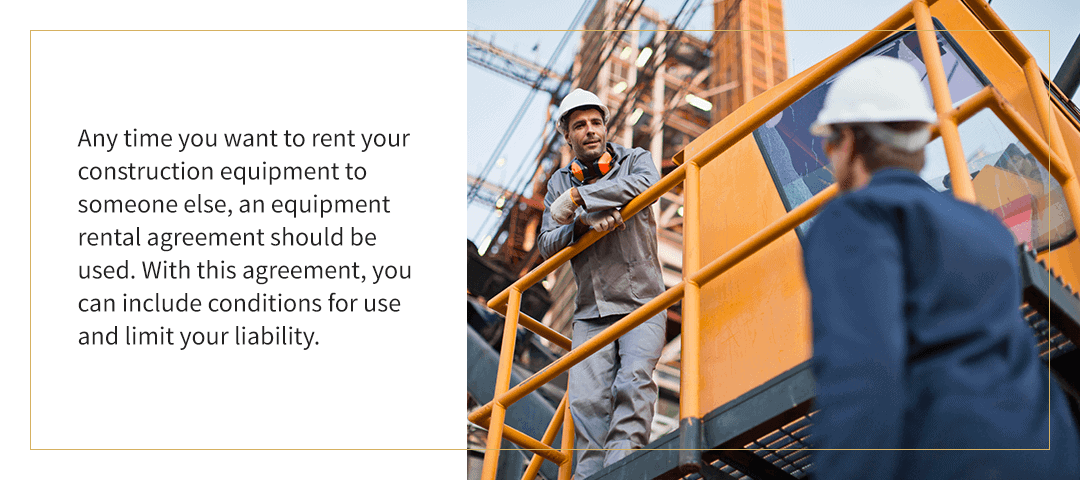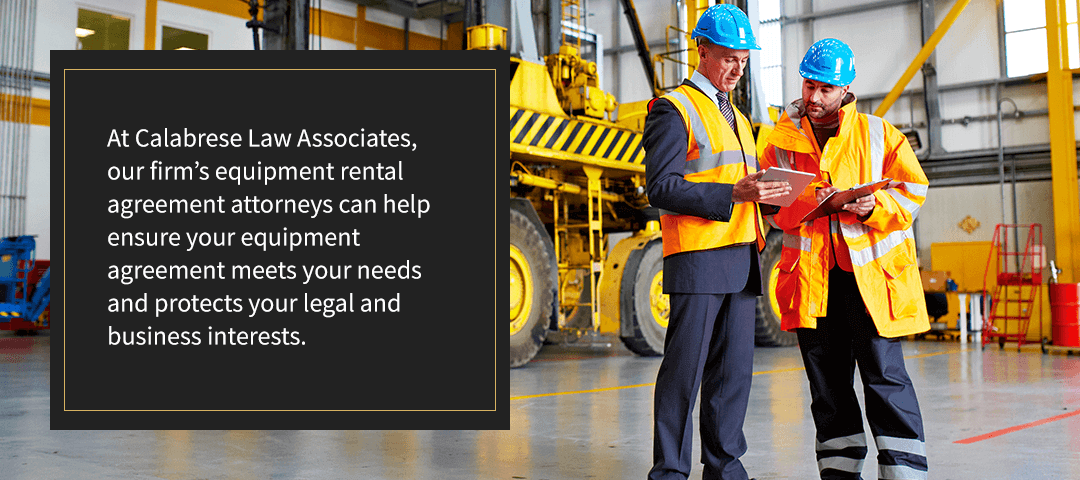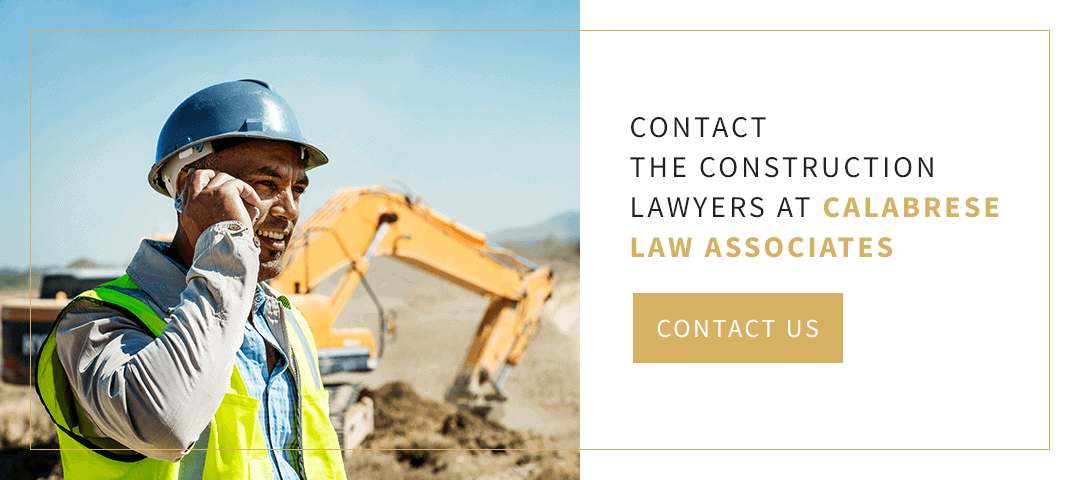In the construction industry, equipment rentals are a key part of doing business. Renting construction equipment makes sense in a host of situations, but especially when the job to be performed is unique — something the construction company may not be involved in again. For many contractors, purchasing expensive construction equipment for a single project is not a prudent business decision.
On the other hand, those construction companies that have construction equipment on hand may rent that equipment when it is not in use, thereby creating an additional revenue stream. In both cases, it is important to have an equipment rental agreement in place before agreeing to rent construction equipment.
The primary reason to use a properly written construction equipment agreement in your business dealings is to protect your legal interests in the event the equipment is damaged, stolen, or otherwise not returned to its owner in substantially the same condition as when it was rented. While it is possible for construction contractors to simply use a template or standard contract, this type of agreement may not adequately protect your interests.
Contact Our Construction Attorneys Now
Working with the experienced Boston-based construction equipment lawyers at Calabrese Law Associates can help ensure your legal interests are properly protected, and you will not be exposed to unnecessary liability or unexpected costs if a problem arises with your construction equipment rental. Utilizing our firm’s legal services can also ensure that you remain fully compliant with current construction contracts and business laws.
Table of Contents
- Understanding Equipment Rental Agreements
- What to Know About Construction Contracts
- What Legal Issues May Arise With Construction Rental Agreements?
- What Can a Construction Attorney Do for You?
Understanding Equipment Rental Agreements
Equipment rental agreements should clearly state:
- The equipment rental fee.
- The duration of the rental, including the pickup and return date.
- Whether delivery and pickup of the rented equipment will be provided by the lessor — i.e. the owner — including any fees for such services.
- A description of the equipment to be rented.
- The names of all parties involved.
- The rights, responsibilities, and liabilities of the parties for repairs, damage, and other mechanical failures that occur during the equipment rental term.
Any time you want to rent your construction equipment to someone else, an equipment rental agreement should be used. With this agreement, you can include conditions for use and limit your liability.
An equipment rental contract may include a fixed end date, or it may outline an indefinite rental period. In a fixed contract, the rental equipment should be returned to the owner by the specified end date. An indefinite rental contract automatically renews until one party notifies the other of their intent to end the contract.
What to Know About Construction Contracts
Construction contracts can be structured in several ways, though they tend to fall into one of the categories below:
- Cost-plus: Cost-plus contracts require the client to cover all the project’s costs, including materials and labor. Additionally, the client will pay a fee to cover the contractor’s profit and overhead, which could be a percentage of the project’s total costs or a fixed fee.
- Fixed price: Also referred to as a lump sum contract, this type of construction contract rolls the project’s costs into a single fixed price or lump sum. Though there may be incentives added to encourage the completion of the project before the stated date, the client is only responsible for paying the price included in the contract.
- Unit pricing: A unit pricing contract breaks down a project’s costs into measurable units. Typically, this breakdown is completed by the scope of the work or kind of tasks, along with the materials needed to perform the tasks.
- Time and materials: This type of contract sets a daily or hourly rate for the project’s contractor. A client also agrees to cover additional costs that may arise during the project and are classified by the contract as overhead, markup, direct, or indirect.
The type of contract that is right for you depends on your client, project, and how you prefer to be paid.
What Legal Issues May Arise With Construction Rental Agreements?
Disputes are common with construction contracts and equipment rental contracts, as they tend to be written in real time. Each change must be documented to prevent confusion, and small details can have a large impact on the project. Disputes include:
- Poor contract administration
- Contractual misunderstandings
- Contractual errors and omissions
- Delays on a construction contract
- Incomplete or unsubstantiated claims by involved parties
Even if an omission seems small, it can have a significant impact on a project. For example, if you are the entity renting your construction equipment, an important issue our construction lawyers at Calabrese Law Associates will address with you is any usage limits you would like to apply to the rental.
Construction equipment and other types of heavy machinery are meant for heavy use, and most companies expect some wear and tear during a rental. However, you may want to add usage limits to ensure your equipment is not used in ways that would cause premature damage or wear to the machinery.
What Can a Construction Attorney Do for You?
At Calabrese Law Associates, our firm’s equipment rental agreement attorneys can help ensure your equipment agreement meets your needs and protects your legal and business interests. For example, when describing the equipment to be rented, our attorneys will ensure that all accessories and any detachable parts are included in the description to prevent any confusion later.
Our firm will also include provisions in your equipment rental agreement that define how you can terminate the contract early should the need arise. If a dispute cannot be resolved through negotiation or mediation, we can help you resolve the issue via litigation.
Contact the Construction Lawyers at Calabrese Law Associates
If you are facing a construction equipment rental agreement dispute, you deserve an experienced construction rental lawyer. To discuss your contract needs with an equipment rental agreement attorney at Boston’s Calabrese Law Associates, call or email us today. Our industry-leading legal services and comprehensive approach can help protect your business interests and your equipment, whether you are renting machinery or leasing your own equipment.
*Attorney Advertising. Prior results do not guarantee a similar outcome.
*This publication and its contents are not to be construed as legal advice nor a recommendation to you as to how to proceed. Please consult with a local licensed attorney directly before taking any action that could have legal consequences. This publication and its content do not create an attorney-client relationship and are being provided for general informational purposes only.





